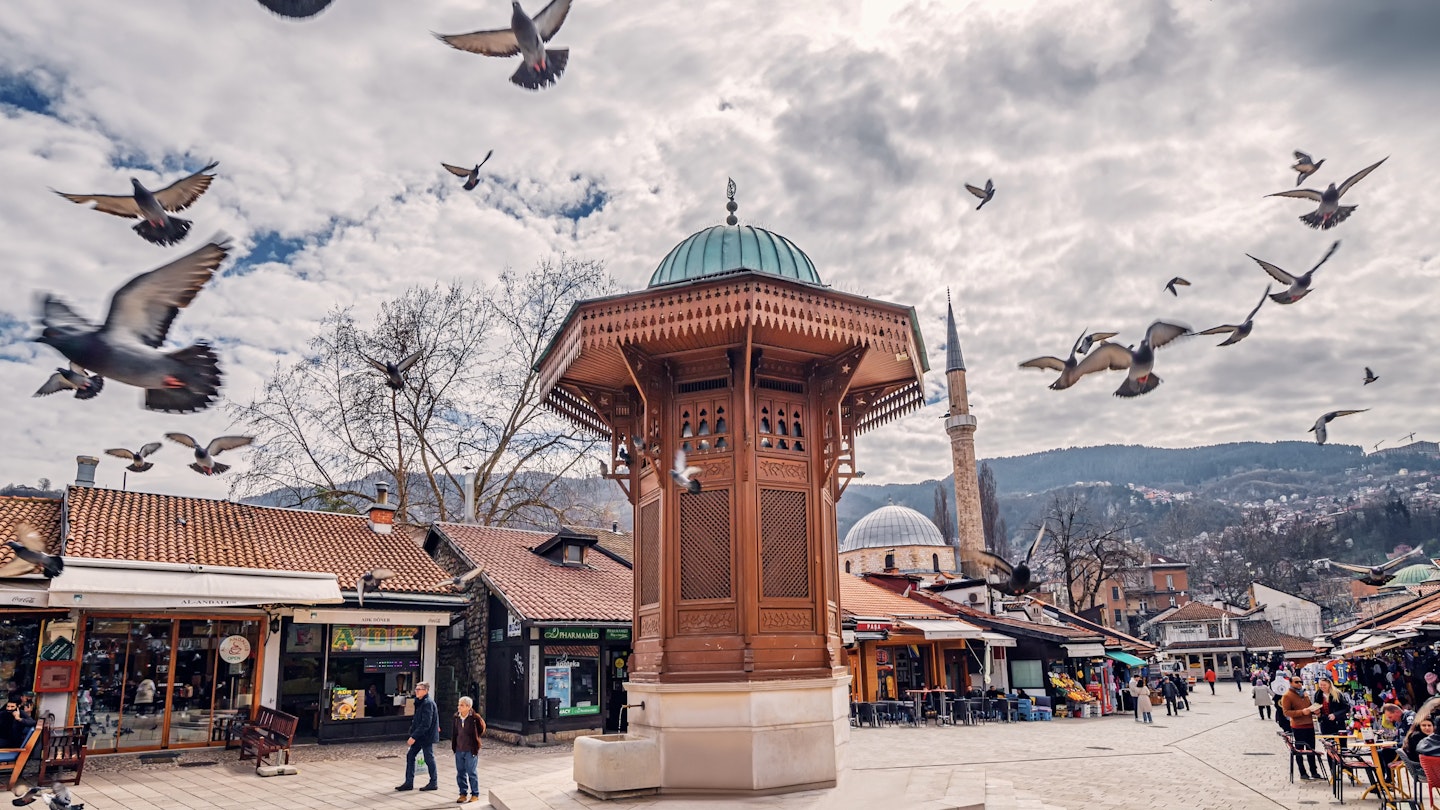Exploring Sarajevo: A Guide by iBestTravel
Sarajevo is renowned for its intriguing architectural medley, vibrant street life, and the irrepressible spirit of its people.
Long known for its religious diversity, the capital of Bosnia & Hercegovina entered the world’s consciousness primarily in the 20th century due to significant events such as the 1914 assassination that precipitated WWI, the 1984 Winter Olympics, and the brutal four-year siege during the Yugoslav Wars of the 1990s.
However, both despite and really because of this potent history, Sarajevo is a place few visitors will forget. If you’re heading there for the first time, here’s what you should know.
When Should I Go to Sarajevo?
There’s no bad time to visit Sarajevo; even winter—when the shortest days regularly see below-zero temperatures—has its charm, especially for snowy sports enthusiasts. Host to the 1984 Winter Olympics, Sarajevo boasts two Olympic-caliber skiing resorts: Jahorina and Bjelašnica, both about 25km (15.5 miles) from the city center. The skiing season runs from November to March, making February the best time to visit for reliable piste conditions. Both resorts offer hotels near the slopes.
If you’re not a fan of the cold, early November offers more manageable temperatures and is also when the three-day Jazz Fest Sarajevo takes place. Spring and autumn provide ideal conditions for hiking in the mountains surrounding the city. Bjelašnica is a fantastic base for hiking to traditional mountain villages like Umoljani, a remote spot where customs have remained unchanged for centuries.
Moreover, summer draws tourists to the wider region, yet Sarajevo keeps a cooler ambiance and is less crowded. Notably, the city hosts cultural events such as the Sarajevo Film Festival in mid-August, and every July, the Baščarijska Noći arts festival showcases music, theater, and various performances in the city center.

How Much Time Should I Spend in Sarajevo?
A weekend in Sarajevo will give you sufficient time to stroll the streets, enjoy local cuisine, and interact with residents. However, it’s recommended to extend your stay by a day or two to venture into the mountains and appreciate the dramatic scenery through hiking.
Is It Easy to Get Around Sarajevo?
Sarajevo is a remarkably walkable city. Furthermore, traveling to more distant destinations is convenient thanks to an extensive network of trams and buses. Tickets can be pre-purchased from kiosks on main streets or bought directly from drivers upon boarding; however, it’s important to validate your ticket once aboard due to common inspections.
Sarajevo International Airport is less than 10km (6 miles) southwest of Baščarija. In town, you will easily find a metered taxi to take you to the airport, but be aware that it’s not always straightforward to find taxis willing to turn on the meter at the terminal.

Top Things to Do in Sarajevo
Absorb Powerful Testimony About the City’s Recent Past
For a powerful perspective on Sarajevo’s recent history, visit the War Childhood Museum. This establishment grew out of a project by Jasminko Halilović, who interviewed survivors of the Sarajevo siege about their experiences during that time. The museum features personal stories accompanied by items donated by their authors, such as diaries and toys that reflect their experiences growing up during the war. Additionally, at the National Museum of Bosnia and Herzegovina, there’s a permanent exhibit documenting daily life during the 1992–95 siege.
Experience Sarajevo’s Coffee Culture
Sarajevo’s café scene is an integral part of local life. Don’t miss the legendary Caffe Tito, adorned with WWII Partisan memorabilia, and Zlatna Ribica, famous for its antiques. When the weather is warm, café tables spill onto the streets, creating a perfect gathering place for friends to chat and enjoy people-watching. It’s customary to linger over a single drink for hours, especially when in the company of locals, who usually cover the bill.
Soak in the Ambiance of Baščarija
Spend a morning wandering around Baščarija, the heart of old Sarajevo, centered on the Sebilj fountain. This merchant quarter, lined with stalls and lively coppersmith alleys, offers a variety of grand Ottoman mosques, restaurants, and inviting cafés.
Take a Walking Tour Through Sarajevo’s History
Follow Sarači Street onto the wide pedestrian boulevard of Ferhadija to discover Austro-Hungarian Sarajevo. Some particularly grand examples of this period’s architecture line the riverfront, though the city’s pride and joy are the storybook neo-Moorish Vijećnica (City Hall) and the Old Orthodox Church. The latter’s current form dates to 1730, yet a church has existed on that site possibly since the 5th century.
Follow this up with a visit to the Jewish Museum, housed in a 1581 Sephardic synagogue, to learn about the story of Sarajevo’s Jewish community.

How Much Money Do I Need for Sarajevo?
While prices have increased in recent years, Sarajevo remains an affordable destination. You can pay by card and Apple Pay in most locations; however, having cash will be useful for smaller purchases.
- Hostel room: from 20KM (US$11)
- Basic room for two: from 60KM (US$34)
- Self-catering apartment: from 70KM (US$40)
- Public transport ticket: 2KM (US$1)
- Coffee: 2KM (US$1)
- Museum entry: 6KM (US$3–4)
- Dinner for two: from 25KM (US$11–12)
- Drink at a bar: from 4KM (US$2)




